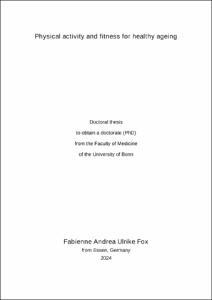Fox, Fabienne Andrea Ulrike: Physical activity and fitness for healthy ageing. - Bonn, 2024. - Dissertation, Rheinische Friedrich-Wilhelms-Universität Bonn.
Online-Ausgabe in bonndoc: https://nbn-resolving.org/urn:nbn:de:hbz:5-74710
Online-Ausgabe in bonndoc: https://nbn-resolving.org/urn:nbn:de:hbz:5-74710
@phdthesis{handle:20.500.11811/11328,
urn: https://nbn-resolving.org/urn:nbn:de:hbz:5-74710,
author = {{Fabienne Andrea Ulrike Fox}},
title = {Physical activity and fitness for healthy ageing},
school = {Rheinische Friedrich-Wilhelms-Universität Bonn},
year = 2024,
month = feb,
note = {The proportion of individuals suffering from age-associated noncommunicable diseases is expected to rise rapidly in the next decades. To maintain health, well-being and socioeconomic stability in an ageing society, identifying and targeting protective and risk factors to support mobility, quality of life and functional independence is imperative. While there is growing evidence that physical activity promotes physiological health, the required dose and intensity for health benefits is unknown and the underlying mechanisms of the beneficial effects of physical activity remain unclear and are likely to be complex.
In this dissertation project, I examined whether physical activity and reduced sedentary behaviours are associated with physiological markers of health, including (1) detailed morphological markers of brain health, and (2) epigenome-wide methylation changes as well as epigenetic ageing, a proxy of biological ageing linked to functional impairment and mortality risk. Lastly, I examined (3) whether vitamin D could aid in the prevention of sarcopenia, the age-associated exacerbated loss of muscle mass and function.
In the Rhineland Study, a large ongoing community-based, prospective cohort study of adults across a wide age range, I demonstrated that higher physical activity levels are associated with greater brain volumes, grey matter density and cortical thickness. I observed the most pronounced effects in motor regions and regions with a high susceptibility to neurodegenerative diseases. Further, I found that physical activity is linked to slower epigenetic ageing and identified methylation changes of several CpGs associated with physical activity levels across the epigenome. Using detailed accelerometer-based physical activity measures, I could show that moderate-to-vigorous intensity activities have comparatively the strongest effect on physiological markers of health. Across all modalities, the effects of physical activity were most pronounced at the lower spectrum and weakened at higher levels. Moreover, I demonstrated that vitamin D levels are associated with greater grip strength, a measure of muscle mass and function. However, at potentially adverse levels, I observed the opposite effect.
In conclusion, physical activity and in particular moderate-to-high intensity activities could be essential in the prevention of neurodegenerative diseases and slow the biological ageing process. Furthermore, a sufficient vitamin D supply could protect against age-associated loss of muscle mass and optimize muscle function across the adult lifespan.},
url = {https://hdl.handle.net/20.500.11811/11328}
}
urn: https://nbn-resolving.org/urn:nbn:de:hbz:5-74710,
author = {{Fabienne Andrea Ulrike Fox}},
title = {Physical activity and fitness for healthy ageing},
school = {Rheinische Friedrich-Wilhelms-Universität Bonn},
year = 2024,
month = feb,
note = {The proportion of individuals suffering from age-associated noncommunicable diseases is expected to rise rapidly in the next decades. To maintain health, well-being and socioeconomic stability in an ageing society, identifying and targeting protective and risk factors to support mobility, quality of life and functional independence is imperative. While there is growing evidence that physical activity promotes physiological health, the required dose and intensity for health benefits is unknown and the underlying mechanisms of the beneficial effects of physical activity remain unclear and are likely to be complex.
In this dissertation project, I examined whether physical activity and reduced sedentary behaviours are associated with physiological markers of health, including (1) detailed morphological markers of brain health, and (2) epigenome-wide methylation changes as well as epigenetic ageing, a proxy of biological ageing linked to functional impairment and mortality risk. Lastly, I examined (3) whether vitamin D could aid in the prevention of sarcopenia, the age-associated exacerbated loss of muscle mass and function.
In the Rhineland Study, a large ongoing community-based, prospective cohort study of adults across a wide age range, I demonstrated that higher physical activity levels are associated with greater brain volumes, grey matter density and cortical thickness. I observed the most pronounced effects in motor regions and regions with a high susceptibility to neurodegenerative diseases. Further, I found that physical activity is linked to slower epigenetic ageing and identified methylation changes of several CpGs associated with physical activity levels across the epigenome. Using detailed accelerometer-based physical activity measures, I could show that moderate-to-vigorous intensity activities have comparatively the strongest effect on physiological markers of health. Across all modalities, the effects of physical activity were most pronounced at the lower spectrum and weakened at higher levels. Moreover, I demonstrated that vitamin D levels are associated with greater grip strength, a measure of muscle mass and function. However, at potentially adverse levels, I observed the opposite effect.
In conclusion, physical activity and in particular moderate-to-high intensity activities could be essential in the prevention of neurodegenerative diseases and slow the biological ageing process. Furthermore, a sufficient vitamin D supply could protect against age-associated loss of muscle mass and optimize muscle function across the adult lifespan.},
url = {https://hdl.handle.net/20.500.11811/11328}
}






